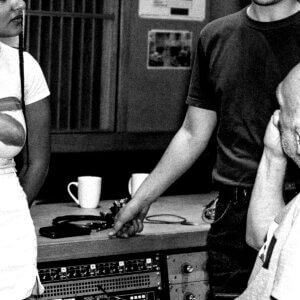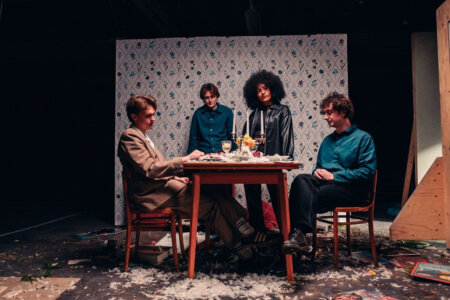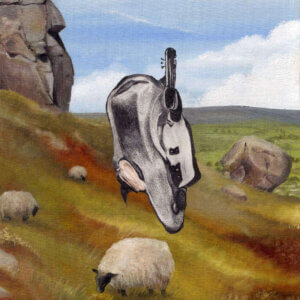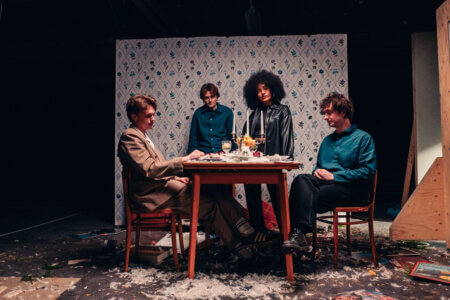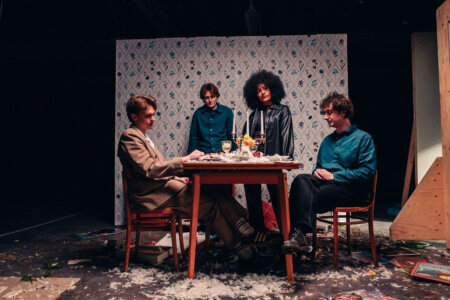English Teacher Continue To Evolve
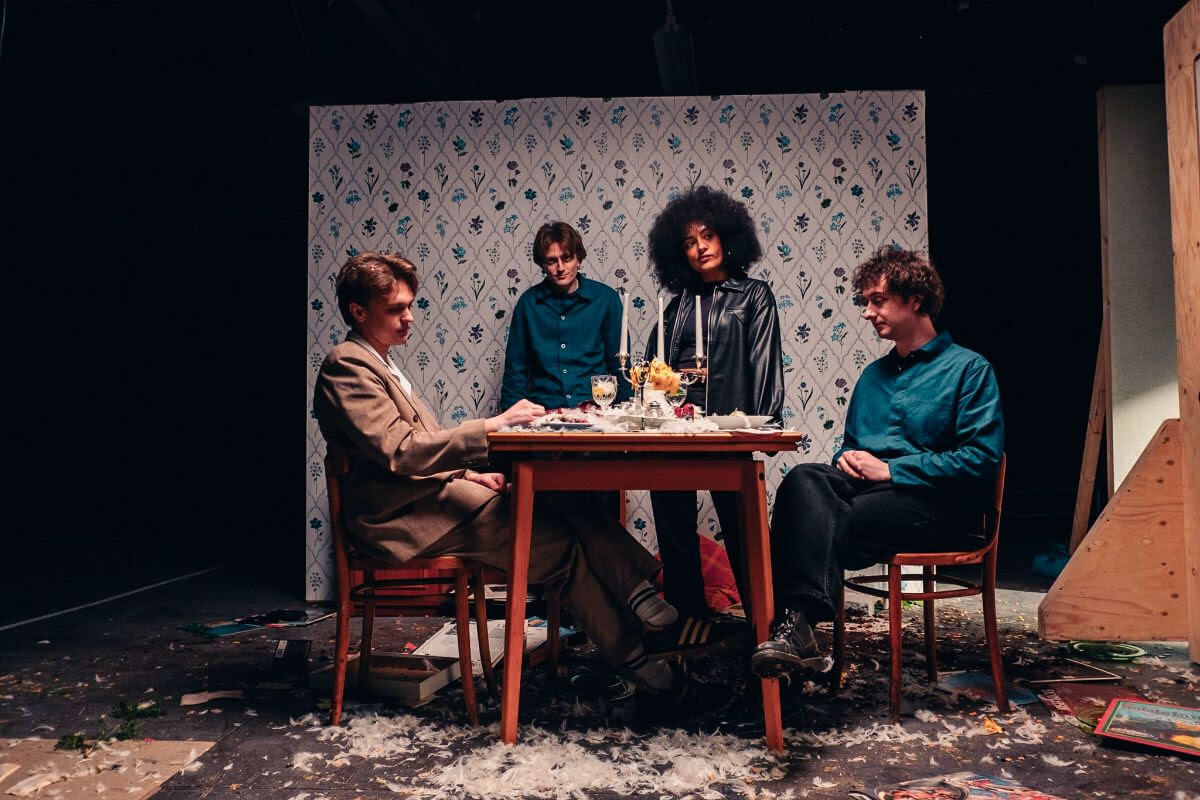
It’s always a bold move to use a song title that holds so much cultural weight and for audiences to expect a cover of said track only to get something unexpected. Leeds-based quartet English Teacher open their vast and vibrant debut record This Could Be Texas with “Albatross”, a title many will either associate with Fleetwood Mac or with the tongue-in-chief television commercials for a British supermarket chain soundtracked by the song. “Albatross” by English Teacher, the opening song to their eager-awaited debut record This Could Be Texas, isn’t a Fleetwood Mac cover. It’s a soaring statement from the band that introduces audiences to their incredible world-building, layers of intricate textures twinkling in the vast arrangement as vocalist, guitarist and chief lyricist Lily Fontaine notes mournfully, “They said, ‘Don’t think you’re special, she’s not the only one.” And yet, in that moment, and for the duration of the record, Fontaine is the only voice that matters.
This Could Be Texas covers an extraordinary breath of soundscapes across its masterfully crafted 13 songs. At times, their musical sensibility is reminiscent of their contemporaries Black Country, New Road, Jockstrap and holds a similar ferocious energy as Dry Cleaning at their most impassioned. Also drawing comparisons to Dry Cleaning, English Teacher’s Lily Fontaine shares an astuteness with Dry Cleaning’s Florence Shaw in her observations about Post-Brexit Britain, the music industry and also eloquently injects humor into everyday vignettes. Musically and lyrically, This Could Be Texas is an enriching and engaging body of work and each return yields something that will stop you in your tracks.
Northern Transmissions spoke to Lily Fontaine and guitarist Lewis Whiting via Zoom in the days leading up to the release of their excellent debut record about how producer Marta Salogni helped them expand their already dynamic sound, Alex Turner and the later Arctic Monkeys’ material, The Strokes and their hopes of English Teacher’s stirring lyricism inspiring change.
Northern Transmissions: I’ve been really enjoying listening to This Could Be Texas, it’s such a vibrant and texturally rich and lyrically captivating record. Sonically, there’s an elevation in the production in the overall expansiveness of the arrangements compared to your 2022 debut EP, Polyawkward. I know that some of the songs were written between 2016 and 2019. A lot has obviously changed for you in that time. How was it revisiting those earlier songs from a different perspective and with more life experiences and also experiences in the music industry?
Lewis Whiting: The vast majority of [This Could Be Texas] was written in 2023. But some of the songs, there were a couple that were old ones that Lily had written around that time, maybe in like 2018, right? Lily Fontaine: Yeah, it was like 2018. I think there’s two of them and then one of them was in 2021, I think that was when we wrote “R&B”. I’m glad that they made it on the album because I’m quite proud of those songs even though they’re quite old. And I don’t know to what extent they’ve really changed. I think we’ve changed massively. I think that’s why the majority of the songs on the album is stuff that we wrote in 2023 because I feel like we found ourselves as musicians more.
NT: It’s nice to have the older songs exist together on the album with more recent material because you get to follow the line from where you started to the direction you’re going towards. It’s important to have that, especially on a debut. You worked with producer Marta Salogni on the album – how crucial was her guidance in the studio and would you say that working with her has maybe given you confidence to be bold with your arrangements and how far you can take a song and also with how you then create a body of work that’s both cohesive in tone but also offers plenty of variety to really engage and captivate audiences?
LW: In terms of production, Marta definitely got what we were going for with the expansiveness of it. There’s quite a lot of space on a lot of the songs and some of them are also quite reverb-heavy in parts. What springs to mind is at the end of “Not Everybody Gets To Go To Space”, she brought a lot to the end of that. We kept going round it and adding layers and live playing space echo, things like that. Those sections that really open-up the song, I think she really got what we were trying to go for. There was one song that she had a fair bit of input on in terms of kind of guiding us with arrangement, for the most part, everything else was ready to go right before we went into the studio. That was “The Best Tears of Your Life”. We sort of had a full structure together but the thing that she told us to do was to listen to “A&W” by Lana Del Rey. We went into the studio with the demo, which we were all playing and she was like, ‘Ok, why don’t we start off really stripped back at the start, just bass, vocals and then build it up. That made things glue together and it fell into place from there.
NT: How would you say that experience and recording process has perhaps informed the way you approach writing and shaping an arrangement with new songs? Or, maybe even made you think about performing live?
LF: I think that there’s a direct influence for a song like “You Blister My Paint”, for example. I think the way we performed that song when we went into the studio and the way we perform it now, since coming out of those sessions, is completely, well not completely different, but it’s got a new instrument on it that changes the feel of the song, and that instrument is production. She introduced this, I don’t know exactly what delay pedal she was using for it, maybe you know Lewis?
LW: I think it was just like an emulation of some tape delay.
LF: Yeah, which is what Marta’s known for is her manipulation of tape delay and it’s become a very key part of the song. Now when we play it live, Lewis plays that delay. And it’s, you know, it’s not random, it’s improvised to an extent, but there’s a melody to it. There’s a structure to the way that you play the delay. So, that’s interesting. That’s a new thing, we’ve added these new technological elements.
NT: Speaking of performing live, how have the shows been going in the lead up to the record coming out?
LF: One of the first shows we played back was at Eurosonic and that was one of my favorite shows ever. Even though I was kind of moody before going on stage when we actually played it, maybe that fueled why it was one of my favorites ever! Just playing to a full room, like for the first time in ages,it felt so good and now I just can’t wait to have that back for the next few weeks.
NT: What have been your favorite songs from the album to play live?
LW: Personally, I really like playing “Broken Biscuits” live. Mainly because there’s a really chaotic ending on the record but live, somehow it descends into even more chaos and it’s really satisfying. We take it to a point and then we all watch each other and it collapses and it’s very fun.
LF: Yeah, that is so fun to play, that ending!
NT: It must be interesting to watch the audiences’ reactions in different cities towards the songs and see which ones they’re really getting into.
LW: Yeah, it’s always interesting. Personally, one thing I find quite nice about it is that it varies quite a lot, which is really nice because sometimes, you know, there’s a couple of songs that are a bit more lively, but I think there’s a good balance. You know, depending on the mood of the room, some songs really like hits. Or in another place where the crowd’s looking for a bit of a dance, those songs hit. But it’s not just the one which I enjoy.
NT: Lily, something I’ve enjoyed about the album as well as it being sonically varied and captivating is how engaging you are as a vocalist and central anchoring personality within the album. And I love how lyrically it’s political, it’s also very personal, but there’s also a lot of everyday observations and moments of humor. I’m always interested in talking to lyricists because it’s such a unique experience of being able to sit down in front of a blank page and get to know yourself very intimately and make sense of the world around you. What has been your experience and process as a lyricist and process of how you’ve evolved in that role?
LF: I mean, it’s my favorite thing in the world. I love it; the feeling of writing something. I’ve never really analyzed how my processes have changed, I don’t even know if it has. But I’m always just waiting for something to come to me and then I get really excited and I start making mind maps and doing lots of research and going on Thesaurus.com! Those are things that have never changed. But yeah, it’s really important for me because, like you say, it’s a way of getting to know yourself. It truly is, I feel like I’ve learnt so much about myself writing the lyrics for this album. It’s also just like catharsis, as well. It’s kind of a necessity for me. I enjoy it and it’s the reason that I wake up on a Monday morning but it’s also the way that I deal with the things that I’m not very happy about in the world. So yeah, it is and always will be my favorite thing to do.
I definitely need to reflect more on how it’s changed. I think that everything else around me has changed and the way that I write is probably the thing that stayed the same, in terms of the lyrical style. Musically, though, it may be different.
NT: How important is it for you to inspire listeners and audiences, whether they’re listening to the recorded album or seeing you on stage. When you’re writing lyrics, how much of it is you wanting to inspire listeners to gain a different worldview and perspectives of the world around them. Especially, with how you write about Post-Brexit Britain, how motivated are you to make people who may be aren’t very politically engaged to inspire them to be more aware and active in striving towards change?
LF: I think that’s the ultimate goal isn’t it! That’s the ideal, in a fantasy world, it would be great if that would happen. I don’t know to what extent it’s possible, but it would be lovely if the things that we talk about inspire change. I think that music does have the potential to do that, it has in the past through being part of different subcultures and scenes that have then gone on to impact society. I think it has that potential, whether or not it actually happens with us…
I think I write with the purpose of trying to cathart for myself and talk about things I want to talk about because I feel like they need to be talked about. Whether or not that provokes change, I’m not going to hate myself if it doesn’t because I just don’t know what the power of this band or the power of music in the general world right now is; how possible that is. It would be lovely,but even if it just makes a couple of people feel something, that’s cool. That’s the dream.
NT: Who are some of the lyricists that you’ve gotten a lot from and been inspired by?
LF: Alex Turner is a massive influence on my songwriting, probably the biggest. Morrisey, for all of his sins, I’ve always been a big fan of the way that he navigates lyricism. Tyler, The Creator is one that I never really talk about. He’s also a controversial figure, I don’t know what my obsession with these people is! But, yeah, I think he’s great,I think he’s wonderful and his work introduced me to structure, in a sense. And then, I guess, there’s a lot of non-musical writers as well that I’m influenced by like Phoebe Waller-Bridge and the way that she employs comedy. I probably haven’t mentioned half of the lyricists that I actually really respect, but those are a few.
NT: I think Alex Turner and Morrissey come through in your lyrical style and the way you structure songs. Especially early Arctic Monkeys and the way they were so good at creating scenes and building worlds in their songs. I was a big Arctic monkeys fan growing up but I’ve found their last two records difficult to get into. How have you received the shift in Arctic Monkeys’ later output?
LF: It’s a point of contention, isn’t it? It’s interesting because coming at it from a musician’s point of view, it makes so much sense for them to change their style in such a dramatic way because if you’ve been doing something for so long, as a person you change. So, of course, your music’s going to change. And I think that clinging to the nostalgia of the early albums makes sense because they’re so good, but then it’s also understandable to explore new sounds.
Do you know what, as well, I feel like for me, even though I don’t listen to the band that much anymore, and I think that’s made me maybe not listen to the newer albums as much because they were very much a band of my teens. I did go and see them in the most recent tour, obviously! But yeah, I haven’t listened to the most recent album as much, and it’s strange because I think if it was released outside of the context of their previous work, I would think it was a masterpiece. But because of that context and because of that history, it’s turned me away from it, even though I think it’s great. And so it’s a weird conflict because I do think it’s really good and there’s some beautiful moments on it. I just don’t listen to it that much. I feel like I understand it more than I listen to it.
NT: Apart from incorporating lyrical influences in your work and approach. Something that’s so striking about English Teacher and This Could Be Texas, is the tonal variety across the instrumentation. You’re very much cultivating your sound and it’s exciting to hear across the debut you embrace and go towards different ideas. Obviously, to be a musician and be in a band, you’re going to have a huge enthusiasm and love for music and listen to different bands and be influenced by their sound. A debut record, I think, is the perfect place to experiment with as many different things and also incorporate your influences because this is how you’re introducing yourself to audiences. Was it difficult to strike that balance of incorporating influences whilst carving your own style and voice?
LW: I guess it’s something that we struggled with because I think we were quite strict with ourselves and we decided that we wanted to try and set the bar as high as we could. I think there wasn’t a particular, I think this album very much felt like an exercise of carving it out and figuring out as we went along. I don’t think we had a set thing that we were aiming towards. But, I think that we did, probably in different ways, but all kind of revert back to what were our big influences and go from there. I know I revisited so many classic albums. That was a big part of the process for me, I was like, ‘Why did I ever want to do this in the first place? Where’s the core of it?’ and go from there.
NT: What were some of the classic albums that you revisited?
LW: Some of them, I got really into analyzing albums that are necessarily not the coolest, but for me are full circle. There’s so much music that I love, but there are albums that went above that level of being a really cool, niche thing and albums that are a bit life-changing for me like, Is This It by The Strokes. That was a big one for me. The first time I heard that, the idea of playing guitar was instantly so cool. The Smiths were another big one.
I can’t think now, but there’s so many. You know those albums that you almost write off because they’re so obvious. They’re just always there in the background, just like pillars of music. Of course they’re good because they’re classics! I got really into trying to figure out why they affected me so much. I wanted to try and take from that, rather than worrying about the specific cool thing we were doing in getting to make an album. For me, it was just about the quality of songs and revisiting that.
NT: What are you most excited about This Could Be Texas being released and people being able to listen to it in full?
LW: I’m really excited for people to just hear it in full because there’s songs that weren’t singles that I’m really proud of, I’m proud of the entire album, but there are songs that I’m really happy with. Yeah, I’m excited for people to hear those songs and I’m excited to tour the album with people knowing those tracks. And just the feeling of relief!
LF: Yeah, same for me. Some of my favorite tracks are ones that haven’t been released. It’ll be nice to…because we’ve seen the reaction to them live and that has been nice. So it’ll be nice to have them out in the recorded sense. And yeah, tour, can’t wait to tour.
Order This Could Be Texas by English Teacher HERE
Latest Reviews
Tracks
Advertisement
Looking for something new to listen to?
Sign up to our all-new newsletter for top-notch reviews, news, videos and playlists.





